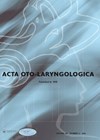
Journal Reviews
Location, location, location: How to get the steroid where you need it, in chronic rhinosinusitis
What almost all current guidelines on chronic rhinosinusitis have in common is the importance of intranasal steroid (INCS) use. However, it is increasingly understood that the efficacy of INCS depends on their efficient delivery to the point of need, i.e....
Sinus implants to treat recalcitrant polyps
It is well established that the burden of chronic rhinosinusitis on healthcare costs and patients’ quality of life is high, and that current mainstream treatment options of oral or topical steroids are not without problems. This paper compares two RCTSs...
Intratympanic steroids - to give or not to give?
The treatment of idiopathic sudden sensorineural hearing loss (ISSNHL) is controversial and different modes of steroids have been tried without any universal consensus. Various authors have reported combined oral and intratympanic steroid therapy in SSNHL, with consistent results in several...
Method of delivery: all topical nasal corticosteroids are not made equal
There is an increasing body of evidence that the role of surgery for chronic rhinosinusitis is to facilitate the delivery of topical medical treatment – most notably, topical corticosteroids. Two recent studies, one using flow dynamics and another one examining...









